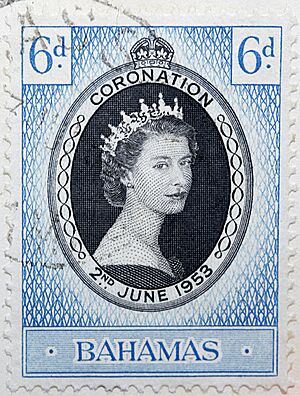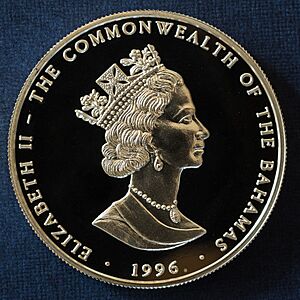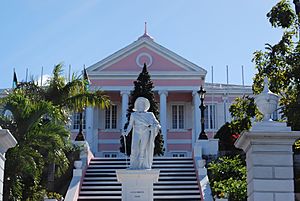Monarchy of the Bahamas facts for kids
Quick facts for kids King of the Bahamas |
|
|---|---|
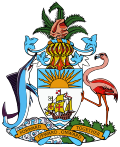
|
|
| Incumbent | |
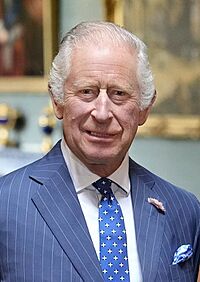 |
|
| Charles III since 8 September 2022 |
|
| Details | |
| Style | His Majesty |
| Heir apparent | William, Prince of Wales |
| First monarch | Elizabeth II |
| Formation | 10 July 1973 |
The monarchy of the Bahamas is a way the country is governed. It means a monarch (a king or queen) is the head of state for the Commonwealth of The Bahamas. This role is passed down through the family.
Since September 8, 2022, King Charles III has been the King of the Bahamas. He represents the Bahamian Crown. Even though he is also the monarch for 14 other independent countries, each country's monarchy is separate. So, he is officially called the King of the Commonwealth of The Bahamas. He and other members of the royal family do public and private duties for the Bahamas. However, only the King has a role in the country's laws.
The King holds all the main power, and his approval is needed for laws to be made. But most of these powers are used by elected members of parliament and judges. Some powers, like firing a prime minister, are very important but are only used in special situations. They act as a safety measure for the monarchy's role.
Today, the Crown helps make sure the government runs smoothly and fairly. It also protects against anyone using too much power. While the King has some special powers, most of his duties are carried out by his representative, the governor-general of the Bahamas.
Contents
How the Monarchy Started
In 1629, King Charles I gave land in America to Robert Heath. This land included the Bahamas. A town called Charles Towne was started in 1660, named after King Charles II. Later, its name changed to Nassau.
The Bahamas became a British crown colony in 1718. This happened when the British stopped piracy there.
In August 1940, the Duke of Windsor became the Governor of the Bahamas. He came with his wife, Wallis, Duchess of Windsor. People praised the Duke for trying to help with poverty on the islands.
In May 1963, a meeting in London discussed a new plan for the islands' government. The Bahamas gained full control over its own affairs. The governor kept power only for foreign matters, defense, and safety within the country.
On July 10, 1973, Charles, Prince of Wales gave the official papers to Prime Minister Lynden Pindling. This made the Bahamas a fully independent nation within the Commonwealth of Nations. Soon after, Sir John Paul became the first governor-general of the Bahamas. He was the representative of Elizabeth II, who was then Queen of the Bahamas.
In 2013, King Charles remembered the independence celebrations. He said he was young enough to attend three parties that night! He also remembered dancing with Marguerite Pindling, the Prime Minister's wife.
The Bahamian Crown: What It Means
The Bahamas is one of fifteen independent countries called Commonwealth realms. These countries share the same monarch. But the monarch's role in the Bahamas is completely separate from their role in any other country. Even though they share the same person as monarch, each country is independent. The Bahamian monarch is represented by the governor-general of the Bahamas.
Since the Bahamas became independent in 1973, the Crown has been both shared and separate. The monarch's role in the Bahamas is unique to the Bahamas. It is not just a British role anymore; it has become a Bahamian one.
This is shown in several ways:
- The King has a special Bahamian title.
- When he acts for the Bahamas, he uses Bahamian symbols. These include the country's national flag and special royal symbols.
- Only Bahamian government ministers can advise the King on Bahamian matters.
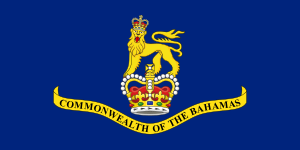
In the Bahamas, the government is officially called "His Majesty the King in Right of The Bahamas."
The King's Title
After independence, Queen Elizabeth II received a special title for her role as Queen of the Bahamas. On August 10, 1973, her title became: Elizabeth the Second, by the Grace of God, Queen of the Commonwealth of the Bahamas and of Her other Realms and Territories, Head of the Commonwealth.
Since King Charles III became King, his title is: Charles the Third, by the Grace of God King of the Commonwealth of The Bahamas and of His other Realms and Territories, Head of the Commonwealth.
This title shows that the Bahamas is an independent monarchy. It highlights the King's role specifically as the King of the Bahamas. Usually, he is called "King of the Bahamas."
Oath of Loyalty
People in important roles in the Bahamas swear an oath of loyalty to the King. This is because the King promises to govern the people fairly.
The oath of loyalty in the Bahamas is:
"I, (name), do swear that I will be faithful and bear true allegiance to His Majesty King Charles the Third, His Heirs and Successors, according to law. So help me God."
Who Becomes King or Queen
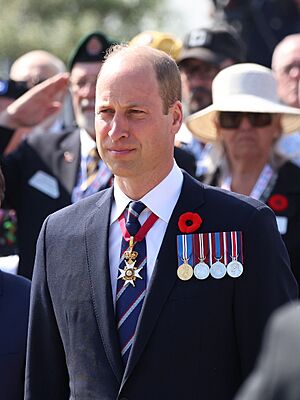
The Bahamas follows the same rules as the United Kingdom to decide who becomes the next King or Queen.
The rules for who inherits the throne are set by laws like the Succession to the Crown Act 2013. These laws say that only natural, legitimate descendants of Sophia of Hanover can become monarch. They also state that the monarch cannot be a Roman Catholic. They must be a member of the Church of England when they become King or Queen.
When a monarch dies or steps down, the next person in line immediately becomes the new monarch. There is no need for a special ceremony right away. A period of mourning follows, and flags are flown at half-mast. The day of the funeral is often a public holiday.
The King's Role in Government

The Bahamian constitution sets up a system where the King and governor-general have legal duties, but they are not involved in politics. The King is at the center of the government's structure. This means all government powers belong to the Bahamian monarch. The government of the Bahamas is officially called His Majesty's Government.
Most of the King's duties in the Bahamas are done by the governor-general. The governor-general is chosen by the King, based on the advice of the Prime Minister of the Bahamas.
All government bodies act under the King's authority. The many powers of the Bahamian Crown are called the Royal prerogative. Parliament does not need to approve these powers. Also, Parliament cannot even discuss a bill that affects the King's powers without his permission.
Running the Government
One of the Crown's main jobs is to appoint a prime minister. The prime minister then leads the Bahamian cabinet. The cabinet advises the King or governor-general on how to use their powers. These powers cover all parts of government and foreign affairs. The King's and governor-general's roles are mostly symbolic. They represent the legal authority for all government actions. The cabinet decides how to use the Royal Prerogative. This includes declaring war, keeping peace, and directing the Royal Bahamas Defence Force. It also includes calling and ending parliament sessions and calling elections.
However, the Royal Prerogative belongs to the Crown, not to the ministers. The constitution allows the governor-general to use these powers alone in special situations. For example, they can dismiss a prime minister or dissolve parliament during a constitutional crisis.
There are also a few duties only the King performs, like appointing the governor-general.
The governor-general appoints the person most likely to have the support of the Bahamian House of Assembly as prime minister. This helps keep the government stable. The governor-general also appoints a Cabinet, usually at least eight other ministers, as advised by the prime minister. The King is kept informed by his representative about changes in prime ministers and other ministers. He stays updated through regular messages from his Bahamian ministers. Many officials in government agencies are appointed by the Crown. The appointment of senators and Supreme Court judges also falls under the Royal Prerogative.
Dealing with Other Countries
The King's powers also extend to foreign affairs. The governor-general approves treaties and international agreements. Parliament does not need to approve these. However, a treaty cannot change Bahamian laws without a special Act of Parliament. The governor-general also welcomes diplomats from other countries. They also issue passports. All Bahamian passports are issued in the governor-general's name.
Parliament's Role
The King, along with the Senate and the House of Assembly, makes up the Bahamian parliament.
The King does not take part in making laws. But the governor-general does, by giving royal assent to new laws. The constitution also says that the governor-general alone appoints senators. The governor-general must appoint nine senators based on the prime minister's advice. Four are appointed on the advice of the leader of the opposition. Three are appointed on the advice of both. The governor-general also calls, ends, and dissolves parliament. After parliament is dissolved, the governor-general usually signs the papers for a general election.
A new parliament session begins with the Opening of Parliament. During this, the King or the governor-general reads the Speech from the Throne.
All laws in the Bahamas become official only when the governor-general gives them royal assent in the King's name. This approval is needed for all acts of parliament.
The Courts
The King is seen as the source of justice in the Commonwealth realms. In the Bahamas, crimes are legally seen as offenses against the King. Court cases for serious crimes are brought in the King's name. For example, it might be called The King versus [Name]. This means the King cannot be charged with crimes in his own courts.
All judges of the Supreme Court are appointed by the governor-general. When they start their job, all Bahamian judges must swear an oath to the King. The Judicial Oath is:
"I, (name), do swear that I will well and truly serve His Majesty King Charles the Third, His Heirs and Successors, in the office of ________ and will do right to all manner of people after the laws and usages of the Bahamas without fear or favour, affection or ill will. So help me God."
The governor-general, acting for the King, can also grant protection from being charged with a crime. They can also use the royal prerogative of mercy to pardon offenses. This can happen before, during, or after a trial.
Cultural Role
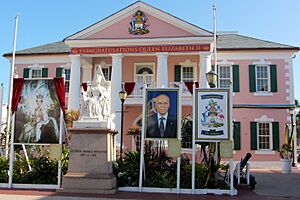
The Bahamian monarch sends special messages to Bahamian citizens. These messages go to those celebrating their 100th birthday. They also go to married couples on their 50th and 60th wedding anniversaries.
Awards and Honours
The King is seen as the source of honours. He gives out awards and honours in the Bahamas in his name. Most of these are given based on the advice of "His Majesty's Bahamas Ministers."
In 2016, the Bahamas created seven national awards. The governor-general is in charge of all these awards.
The Defence Force
The King is the highest authority in the Bahamian Defence Force. This is shown by the prefix HMBS on Bahamian naval vessels. This means His Majesty's Bahamian Ship.
The Defence Force of the Bahamas is called "The Royal Bahamas Defence Force". The King is its Head.
In September 1979, Princess Anne visited the Defence Force Base. She officially gave the Force the title "Royal." This made it known as the "Royal Bahamas Defence Force."
Every member of the Royal Bahamas Defence Force must swear loyalty to the Bahamian monarch. The oath is:
"I, (name), swear by Almighty God that I will be faithful and bear true allegiance to His Majesty King Charles the Third, His Heirs and Successors, according to law, and that I will, as in duty bound, honestly and faithfully defend the Commonwealth of The Bahamas against all enemies, and will observe and obey all lawful orders of Commander Defence Force and of the officers, warrant officers and marines set above me."
The Police Force
The national police force of the Bahamas is called "The Royal Bahamas Police Force".
The St. Edward's Crown appears on the Bahamian Police's badges. This shows that the monarchy is the source of authority.
Every member of the Royal Bahamas Police Force must swear loyalty to the King of the Bahamas. The oath they take is:
"I, (name), do swear that I will well and truly serve our Sovereign lord the King, in the office of _____ without favour or affection, malice or ill will, and that I will cause His Majesty's peace to be kept and preserved; and that I will prevent, to the utmost of my power, all offences against the same; and while I shall continue to hold the said office I will, to the best of my skill and knowledge, discharge all the duties thereof faithfully according to law. So help me God."
Bahamian Royal Symbols
The main symbol of the Bahamian monarchy is the King himself. His framed pictures are displayed in public buildings. Banknotes in the Bahamas also show the monarch's portrait. The monarch also appears on special Bahamian stamps.
A crown is also used to show the monarchy's authority. It appears on the badges of police, postal workers, and prison officers.
God Save the King is the royal anthem of the Bahamas.
New Bahamian citizens must promise loyalty to the King of the Bahamas and his future heirs.
Royal Visits
Members of the royal family have visited the Bahamas many times.
Queen Elizabeth II and her husband Prince Philip, Duke of Edinburgh, visited in February 1966. In July 1973, Charles, Prince of Wales, represented the Queen at the Bahamian independence celebrations. The Queen and her husband returned in February 1975, and again in October 1977 for her Silver Jubilee. Princess Anne visited in 1979 to celebrate 250 years of Bahamian democracy.
Charles and Diana, the Prince and Princess of Wales, visited in 1982 for a 10-day holiday. The Queen and Prince Philip visited Nassau in October 1985. They visited again in March 1994.
Prince Harry visited the Bahamas in March 2012. This was part of his tour to mark the Queen's Diamond Jubilee. He said the country's motto, "Forward, Upward, Onward, Together," showed the Queen's lifelong dedication to service. Princess Anne visited the Bahamas in 2015. The Earl and Countess of Wessex visited in 2016.
The Duke and Duchess of Cambridge toured the country in March 2022. This was to mark the Queen's Platinum Jubilee. The Earl and Countess of Wessex visited in February 2023 for a youth awards ceremony.
Future of the Monarchy
The idea of the Bahamas becoming a republic (having a president instead of a monarch) has not been a big topic. A group that looked into the constitution found "mixed feelings" about it. Many people did not have strong opinions. In 2020, a former Attorney General said that becoming a republic might happen one day. But he noted there was no strong desire for it among the public or politicians yet. Some smaller political parties, like the Coalition of Independents, support becoming a republic.
After King Charles III became King, Prime Minister Philip Davis said his government plans to hold a vote on becoming a republic. In 2023, a small majority of Bahamians supported becoming a republic. The year before, more people supported keeping the monarchy.
Kings and Queens of the Bahamas
| Picture | Name of Monarch (Born–Died) |
Time as King/Queen of the Bahamas | Full Name | Spouse | Royal Family | |
|---|---|---|---|---|---|---|
| Start | End | |||||
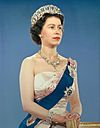 |
Elizabeth II (1926–2022) |
10 July 1973 | 8 September 2022 | Elizabeth Alexandra Mary | Philip Mountbatten | Windsor |
| Governors-general: Sir John Paul, Sir Milo Butler, Sir Gerald Cash, Sir Henry Milton Taylor, Sir Clifford Darling, Sir Orville Turnquest, Dame Ivy Dumont, Arthur Dion Hanna, Sir Arthur Foulkes, Dame Marguerite Pindling, Sir Cornelius A. Smith Prime ministers: Sir Lynden Pindling, Hubert Ingraham, Perry Christie, Hubert Minnis, Philip Davis |
||||||
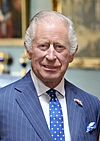 |
Charles III (b. 1948) |
8 September 2022 | present | Charles Philip Arthur George | Camilla Shand | Windsor |
| Governors-general: Sir Cornelius A. Smith, Dame Cynthia A. Pratt Prime ministers: Philip Davis |
||||||
See also
- The Bahamas Platinum Jubilee Sailing Regatta
- Lists of office-holders
- List of prime ministers of Elizabeth II
- List of prime ministers of Charles III
- List of Commonwealth visits made by Elizabeth II
- Monarchies in the Americas
- List of monarchies
 | Anna J. Cooper |
 | Mary McLeod Bethune |
 | Lillie Mae Bradford |


